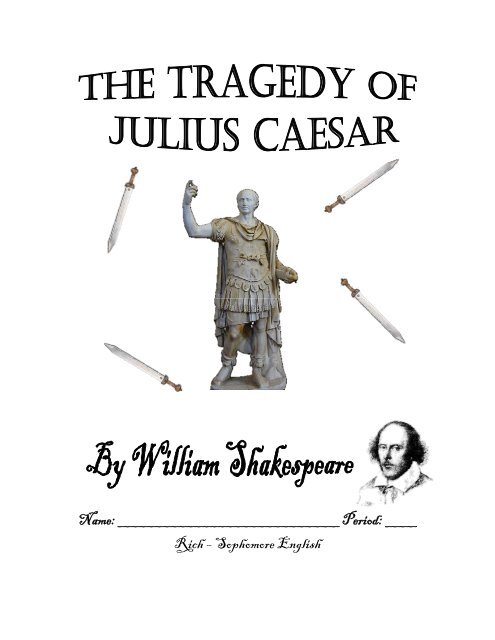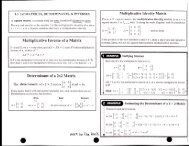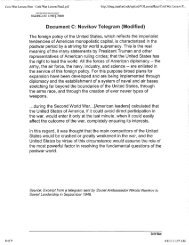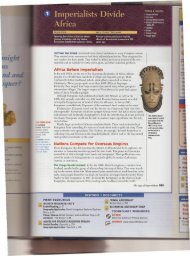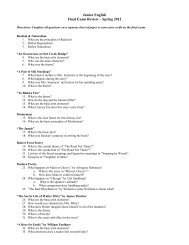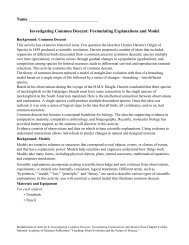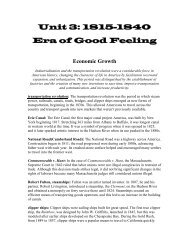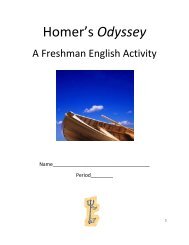Rich – Sophomore English - Staff Web Server
Rich – Sophomore English - Staff Web Server
Rich – Sophomore English - Staff Web Server
Create successful ePaper yourself
Turn your PDF publications into a flip-book with our unique Google optimized e-Paper software.
Name: ____________________________ Period: ____<br />
<strong>Rich</strong> <strong>–</strong> <strong>Sophomore</strong> <strong>English</strong>
The Roman Empire-PowerPoint Presentation<br />
Directions: This assignment is designed to show your ability to research an aspect of t he Roman<br />
Empire and create a PowerPoint slide show to share with the class teaching them what you have<br />
learned. Here are the guidelines.<br />
1. This slide show will be worth 40% of your fourth quarter grade. You<br />
MUST be present in class the day your topic is designated scheduled<br />
to present. Absences will result in a grade of zero points (even excused<br />
or school-related are not allowed). Only extreme emergency will be<br />
considered.<br />
2. Your slide show must be a minimum of seven slides but no more than<br />
ten slides. Your presentation must be no more than ten minutes long.<br />
3. The first slide (of your required seven to ten slides) must be a title slide, which contains<br />
your name, your topic, and the date of your presentation. Feel free to add creative<br />
visuals to this as well.<br />
4. The last slide (of your required seven to ten slides) must be a Works Cited page in<br />
MLA format, which includes all sources used for your text/graphics. Refer to your<br />
graded Works Cited page from the debates and your public speaking unit packet for<br />
information on MLA format.<br />
5. At least five sources must be used in creating this slide show-at least two for your text<br />
and at least three for your graphics.<br />
6. All content slides must have a title line at the top with text listed in bulleted for<br />
numerical format. Avoid full paragraphs and even complete sentences. Remember<br />
less is more with text, so be concise using short phrases. Make all text easy for the<br />
class to read.<br />
7. All slides must use a consistent and pleasing background that does not interfere with<br />
text/graphics.<br />
8. All content slides must have a graphic/picture that aids in the understanding of the<br />
text on that slide. Be creative here-remember readability and visual appeal as well.<br />
9. When presenting your slide show, do NOT merely read the slide to the class. You can<br />
use note cards to aid you, but this presentation should be given in the manner of a<br />
speech with eye contact. No need to dress up, though.<br />
10. Avoid timed slides because this interferes with your presentation. Also, be careful using<br />
sound effects and custom animation. Make sure these enhance instead of detract from<br />
your slide show.<br />
11. On the day of your presentation, turn in a printed handout version of your slide<br />
show with SIX SLIDES per page. You may print in color of black/white. You will<br />
also turn in a photocopy of all sources (articles) used in creating your slide show to<br />
verify the accuracy of your Works Cited page.
Topic List for Roman PowerPoint Presentation<br />
1. Biography of Marcus Brutus<br />
2. Biography of Caius Cassius<br />
3. Roman money<br />
4. Roman architecture<br />
5. Roman aqueducts and sewer system<br />
6. Roman shopping and marketplace<br />
7. Education<br />
8. Roman military battles, soldiers, and<br />
weaponry<br />
9. Roman baths<br />
10. Feast of Lupercal<br />
11. Taxes<br />
12. Roman calendar<br />
13. Biography of Octavius (Agustus)<br />
Caesar<br />
14. Gladiator and gladiator games<br />
15. Chariot races<br />
16. Early medical science<br />
17. Death and burial<br />
18. Transportation (Roman roads)<br />
19. Travel outside of Rome<br />
20. Trade and relations with foreign<br />
governments<br />
21. Superstitions, omens, and ghosts<br />
22. Roman clothing styles of the<br />
different classes<br />
23. Women’s roles in Roman society<br />
24. Biography of Marc Antony<br />
25. Biography of Queen Cleopatra<br />
26. Roman orators (speakers)<br />
27. Roman literature and authors<br />
28. Roman republic vs. Imperial Rome<br />
29. Religion, worship, and sacrifice<br />
30. Theaters and music<br />
31. Family life and housing<br />
32. Food and cooking<br />
33. Holidays<br />
34. Roman Emperors after Augustus<br />
35. The fall of the Roman Empire
Name: _______________________<br />
An Introduction to Shakespeare’s Language<br />
Since Shakespeare wrote nearly four hundred years ago, some of the conventions that he uses in his plays<br />
present problems for modern readers. Most of Shakespeare’s lines are written in poetry. Although these lines<br />
do not usually rhyme, they do have a set rhythm (called meter). To achieve the meter, Shakespeare arranges<br />
words so that the syllables, which are stressed or said more loudly than others, fall in a regular pattern: dah<br />
HUM dah DUM dah DUM dah DUM dah DUM. For example, read the following lines from Hamlet aloud:<br />
♣<br />
Neither a borrower nor a lender be,<br />
For lean oft loses both itself and friend.<br />
♣<br />
nei THER a BOR rower NOR a LEN der BE,<br />
for LOAN oft LO ses BOT it SELF and FRIEND.<br />
♣<br />
The pattern of one unstressed syllable followed by a stressed one, dah DUM, is called an iamb. Each pattern is<br />
referred to as a foot. Because Shakespeare uses five iambic feet to a line, this pattern is known as iambic<br />
pentameter.<br />
In order for Shakespeare to maintain the set meter of most lines, he often structures the lines differently than<br />
normal <strong>English</strong> speech. He may change the normal order of words so that the stresses syllables fall in the<br />
appropriate place. For example, the following sentence has no set meter:<br />
♣<br />
You WON’T GO till I SET up a GLASS for YOU.<br />
♣<br />
However, Shakespeare turns these words around a bit to maintain the meter in Hamlet:<br />
This above all — to thine ownself be true;<br />
And it must follow, as the night the day,<br />
Thou canst not then be false to any man.<br />
Polonius, Act I, scene iii<br />
Hamlet<br />
Where’s Where in Julius Caesar<br />
This map lists the Roman kingdom during Caesar’s<br />
time as ruler. Refer to it as necessary, especially<br />
during your reading of Acts IV and V.<br />
4
The First Triumvirate (Before play begins)<br />
Julius Caesar<br />
Crassus<br />
Pompey<br />
Who’s Who in Julius Caesar<br />
*Julius Caesar, dictator of Rome—Calpurnia, his wife<br />
*Marcus Brutus, Roman praetor—Portia, his wife<br />
Servants to Brutus<br />
Claudius<br />
Clitus<br />
Dardanius<br />
Lucius<br />
Strato<br />
Varro<br />
Comrades in Arms (w/<br />
Brutus)<br />
Young Cato<br />
Messala<br />
Titinius<br />
Volumnius<br />
Lucilius<br />
*Pindarius, servant of Cassius<br />
*Artemidorus, teacher of rhetoric and a soothsayer<br />
Senators<br />
Cicero<br />
Popilius<br />
Publius<br />
The Second Triumvirate (after Caesar dies)<br />
Octavius Caesar<br />
Mark Antony<br />
M. Lepidus<br />
Tribunes<br />
Flavius<br />
Marullus<br />
*Other senators, citizens, guards, attendants, and another poet<br />
Let’s start by going<br />
around the room—say<br />
your name and your<br />
favorite gladiator.<br />
Conspirators against<br />
Caesar<br />
Marcus Brutus<br />
Decius Brutus<br />
Casca<br />
Metellus Cimber<br />
Cassius<br />
Cinna<br />
Ligarius<br />
Trebonius<br />
5
Notes on William Shakespeare and Julius Caesar<br />
I. Shakespeare’s Life<br />
A. Born: ___________________ Died: ____________________<br />
He died almost ___________________ years ago.<br />
B. Born in __________________________________ in<br />
Warwickshire in the country of _________________________<br />
C. Regarded as “___________________________________”<br />
D. Wrote _____________ plays in ________________ years and<br />
Numerous __________________________<br />
E. Better than any other writer before him because he understood _____________________<br />
____________________<br />
F. Lived during the _____________________ (1350-1600)<br />
1. Time of ________________________ in Europe<br />
2. When Europe made the first expeditions to the ___________________<br />
___________________<br />
3. ____________________________ advanced and the ____________________<br />
flourished<br />
4. Ancient ____________________ and __________________ were being<br />
rediscovered by archeologists<br />
G. Lived during __________________ ___________________ Reign (1558 <strong>–</strong>1603)<br />
1. ____________________ became very powerful<br />
2. People knew little about life in ancient _____________; therefore details of<br />
_______________________ life are mixed in The Tragedy of Julius Caesar<br />
H. Family life<br />
1. Married ___________ ________________<br />
2. Father of _______________ children ______________, ___________________,<br />
and _______________<br />
I. Actor and playwright at the age of ___________<br />
1. Wrote four types of plays:<br />
_______________________, __________________, ___________________,<br />
and _________________<br />
2. The Tragedy of Julius Caesar is _________________ that is bases on<br />
__________________<br />
3. His plays were performed in three theaters most often the<br />
______________________.<br />
4. _______________________ watched the plays from the ground, not seats in the<br />
theater<br />
5. _____________________ played female roles in his plays.<br />
6. _____________________ is one of the first plays to be performed in the U.S.<br />
II. Shakespearean Conventions<br />
A. A convention is an ___________________ between the artist and the audience.<br />
B. _________________________: character speaks alone on stage, used to convey<br />
character’s thoughts and feeling directly to the audience.<br />
C. ______________________: remarks made by characters to audience or another<br />
character on stage; not meant to be heard by other characters on stage.<br />
D. ____________________: when characters speak in poetry<br />
E. ____________________: when characters speak in regular sentences that form<br />
paragraphs<br />
6
1. __________________: unit of rhythm in poetry where one unstressed syllable is<br />
followed by a stressed one<br />
(U I)<br />
2. ____________________ _____________________:<br />
unrhymed poetry with five iambs to a line. Also known as _____________________<br />
____________________<br />
III. Shakespeare’s Dramatic Structure<br />
A. his plays have a definite _____________________.<br />
Act III _________________<br />
Act II _______________ Act IV ________________<br />
Act I _______________ Act V _______________<br />
B. A tragedy must have a figure of high status with a<br />
______________ ______________ in his/her personality<br />
C. This tragic hero is a ____________________________<br />
_________________________________________________<br />
D. ________________ and _________________ are tragic characters.<br />
IV. Historical background of The Tragedy of Julius Cesar<br />
A. Takes place in ______________ in ___________ Century B.C.<br />
B. Play based on the book ____________________________<br />
C. Play is more than a collection of facts; it is a _______________________ and<br />
___________________ of history<br />
D. Julius Caesar—the man<br />
1. Lived _________________-_______________ B.C.<br />
2. Called “ __________________________________” because of his influence on<br />
Rome<br />
3. Banished from Rome because of an _____________ __________________<br />
4. Trained for a ____________________ career by studying<br />
____________________ _________________<br />
5. On his way to _______________________ to study, he was<br />
captured by _________________________<br />
6. Returned to Rome and set out to _________________<br />
_______________________<br />
7. He did this by:<br />
a. __________________________________________<br />
b. __________________________________________<br />
8. Raised ___________________ __________________ to a position of wealth and<br />
power<br />
9. Brilliant military _____________________________<br />
10. After defeating ________________________ forces in Africa and Spain, he<br />
returned to __________________<br />
11. Rome wanted to make him ______________________ for life<br />
E. ____________________________________, Romans expelled their last king named<br />
_______________________ who was a ________________________ and set up a<br />
___________________________ government<br />
F. This is where the play begins. Caesar just arrived in Rome with<br />
_____________________ ___________________ among the people. However, others<br />
_______________________ and _______________________ for the republic should he<br />
be named _________________________<br />
7
Literary Terms<br />
Directions: Write a definition of each literary term below. You will need to apply these<br />
definitions during our unit on The Tragedy of Julius Caesar. The definitions can be found in the<br />
back of your literature book pp. 995-1,006.<br />
1. Anachronism:<br />
2. Antagonist (look under protagonist):<br />
3. Aside<br />
4. Blank verse<br />
5. Iamb (look under meter):<br />
6. Iambic pentameter:<br />
7. Protagonist:<br />
8. Pun:<br />
9. Situational Irony:<br />
10. Soliloquy:<br />
11. Theme:<br />
12. Tragedy:<br />
13. Tragic flaw:<br />
14. Verbal irony:<br />
8
Fun with Puns<br />
A pun is a play on words. It is the usually humorous use of a word in such a way as to<br />
suggest two or more of its meanings, or the meaning of another word similar in sound.<br />
For example: During the recent near-hurricane in New York, a business man<br />
looked out of his window and remarked, “It’s raining cats and dogs today.” “I know,”<br />
said his partner, “I just stepped into a poodle!” (Get it—--poodle/puddle? ☺)<br />
Shakespeare used puns often in his plays. For this RN, you will practice recognizing puns from a<br />
variety of different places.<br />
1. Let’s start with an easy one from advertising. Have you ever heard the radio commercial for the<br />
company The Glass Doctor? It goes: “Call The Glass Doctor; we’ll fix your panes.” Explain the pun<br />
here:<br />
_____________________________________________________________________________________<br />
___________________________________________________________________________________<br />
2. Read the comic below:<br />
Explain the pun here:<br />
_____________________________________________________________________________________<br />
___________________________________________________________________________________<br />
3. Have you seen the Spongebob Squarepants episode called “Frankendodle”? It’s the one where<br />
Spongebob has to battle his evil, messily drawn twin. There are many puns in this episode, here are two:<br />
First example: “Well, Doodle, it looks like this is a draw.”<br />
Explain pun here:_________________________________________________________<br />
Second example: “You’ve made your point.”<br />
Explain pun here:_________________________________________________________<br />
9
4. Have you ever watched Aladdin? Most of the kiddie humor comes in the form of puns.<br />
See how many puns you can catch in this video clip.<br />
________________________ _______________________ _____________ ________<br />
________________________ _______________________ _____________________<br />
Now it’s your turn. Complete the rest of the handout on your own.<br />
5. Even string cheese sticks have puns on the packages to entertain the kids as they eat. These puns are in<br />
the form of riddles. Can you figure these out?<br />
First example: “What has a thousand ears but can’t hear? <strong>–</strong> a cornfield.<br />
Explain: _____________________________________________________________________________<br />
Second example: “What kind of bank has no money?” <strong>–</strong> a river bank.<br />
Explain: _____________________________________________________________________________<br />
Third example: “What kind of phone never rings?” <strong>–</strong> a saxophone.<br />
Explain: _____________________________________________________________________________<br />
Now for the hard part. Turn to your literature book, pg. 777, and see if you can find at least three<br />
puns at the beginning of the play The Tragedy of Julius Caesar.<br />
First example quote: “_________________________________________________________” line #____<br />
Explain the pun here: ___________________________________________________________________<br />
2nd example quote: “__________________________________________________________” line #____<br />
Explain the pun here: ___________________________________________________________________<br />
3rd example quote: “__________________________________________________________” line #____<br />
Explain the pun here: ___________________________________________________________________<br />
10
Directions:<br />
To help you better understand and follow Shakespeare’s play, read the summary of specific scenes<br />
immediately before you begin to read the original. If you get lost during the scene, refer to the summary again.<br />
Act I: Scene i<br />
Flavius and Marullus, two tribunes who are the elected representatives of the people of Rome, meet a carpenter<br />
and cobbler in the streets. The tribunes ask the citizens why they have taken the day off from work. They<br />
reply that Caesar is returning after defeating Pompey’s sons. Flavius and Marullus scold the citizens and<br />
remind them that they once also celebrated Pompey’s return. Flavius and Marullus then decide to remove the<br />
scarves that decorate the statues of Caesar throughout the city.<br />
Act I: Scene ii<br />
During the foot race to celebrate the Feast of Lupercal, Caesar directs his wife Calphurnia to stand close to the<br />
racecourse, so that Mark Antony can touch her and cure her barrenness. The Soothsayer warns Caesar to<br />
beware the Ides of March (March 15).<br />
Cassius asks Brutus to explain what has been bothering him lately. Brutus, who is at the first reluctant to<br />
reveal his concerns, admits finally that he’s afraid the people of Rome will make Caesar their king. If Caesar<br />
becomes king, the Roman Republic will come to an end. Cassius points out how human Caesar is. First,<br />
Cassius tells how he saved Caesar from drowning once, saw Caesar catch a fever, and witnessed one of<br />
Caesar’s epileptic seizures. They hear the crowds cheer three times. Cassius then points out that Brutus is as<br />
honorable a man as Caesar, but Caesar is gaining power. Brutus promises to think about what Cassius has said<br />
and discuss it with him further at a later time.<br />
Caesar admits he doesn’t trust Cassius, for he “thinks too much” and doesn’t show his thoughts or feelings<br />
openly. Casca then tells Brutus and Cassius how Caesar has declined the crown three times. They also learn<br />
that Caesar had another seizure and that Caesar has had Marullus and Flavius killed for removing the<br />
decorations from Caesar’s statues.<br />
Once Cassius is alone, he comments that although Brutus is Caesar’s friend, he may be ready to change.<br />
Act I: Scene iii<br />
The same evening Casca and Cicero meet during a violent thunderstorm. Although Cicero sees the storm as<br />
wonderful; Casca describes the frightening omens he has seen since he escorted Caesar home. Casca has never<br />
seen a storm that dropped fire until tonight. Casca saw a slave hold up his hand have it catch fire, yet not be<br />
burned. When Casca passed the Capitol, he met a lion that ignored him. A group of women claimed to have<br />
seen men “all in fire” walking the streets. Finally, he adds that an owl (the bird of night) was seen in the<br />
market at noon.<br />
Cicero asks if Caesar will come to the Senate the next day. Casca replies that Antony has planned to send for<br />
Caesar.<br />
Casca then meets Cassius. Cassius has dared the storm to strike him and been spared. Cassius suggests that<br />
the world is out of order because an ordinary man (Caesar) has grown too powerful. Even Casca can guess<br />
that Cassius means Caesar, whom the Senate plans to name king the next day. Cassius, who opposes giving up<br />
the representative republic form of government to Caesar, suggest that his dagger will keep Cassius a free man.<br />
Casca also vows to fight to retain his freedom. Cassius then convinces Casca that Caesar is a tyrant and enlists<br />
Casca’s support.<br />
When Cassius meets Cinna, Cassius promises to get Brutus’ support for the plot against Caesar. Cassius<br />
instructs Cinna to take a note to Brutus and then meet him and the other conspirators at Pompey’s theater.<br />
Cassius and Casca promise to meet the others after they’ve spoken with Brutus.<br />
11
Julius Caesar Act I Study Guide Questions<br />
Directions: After reading the act, supply a complete answer to the following questions.<br />
1. How do the common people (the carpenter and cobbler) feel about Caesar?<br />
2. How do the noble men Marullus and Flavius feel about Caesar?<br />
Name __________________<br />
3. The noble men can’t believe the commoners have so quickly forgotten about the previous great leader<br />
who Caesar defeated in battle. Who was he?<br />
4. What do Marullus and Flavius plan to do with Caesar’s statues? Why?<br />
5. What two events are the people celebrating on this day?<br />
6. What is the date (month, day, and year) of this first scene of the play?<br />
7. In scene ii, the superstitious side of the people is shown when Caesar asks his wife Calpurnia to stand<br />
so that Marc Antony can touch her when he runs by. Why does he ask her to do this?<br />
8. There is foreshadowing in this scene. Who warns Caesar? __________________________ What does<br />
he say? ________________________________________________________ What does this mean?<br />
9. How does Caesar react to this warning?<br />
10. In line 46 of scene ii, Brutus says he is at war with himself. This is the main conflict of Act I. What is<br />
Brutus struggling with in his mind?<br />
11. In the early part of scene ii, Cassius attempts to get Brutus to join the conspiracy against Caesar. Why<br />
doesn’t Cassius just ask Brutus directly?<br />
12. How does Cassius say he saved Caesar’s life?<br />
Feast of Lupercal Foot Race<br />
12
13. What does Cassius’s quote in lines 139-141 mean?<br />
14. Read lines 154-161 to see how does Cassius persuade Brutus to feel guilty and consider it his duty to<br />
get rid of Caesar before he is crowned King?<br />
15. What does Caesar’s quote in lines 194-195 mean?<br />
16. Casca explains what happened while Cassius and Brutus were off talking. What happened with<br />
Caesar?<br />
17. What two physical handicaps do we learn Caesar has in scene ii?<br />
18. What does Casca’s quote, “It was Greek to me” on line 284 mean?<br />
19. What has happened to Marullus and Flavius?<br />
20. In his soliloquy at the end of scene ii, what does Cassius reveal that he will do?<br />
21. What end result do you think Cassius hopes to achieve?<br />
22. Scene iii takes place almost one month after scene ii. It is a very late and very story night on the<br />
evening of March 14, 44 B.C. Why do you think Shakespeare uses this type of weather here?<br />
23. In this scene, what strange occurrences are Casca and Cassius discussing?<br />
24. In scene iii, Cassius asks Casca about joining the conspiracy, just as he had Brutus earlier in the play.<br />
How is his approach different with Casca than it was with Brutus?<br />
25. Cassius has had one month since the play began to get others to join his conspiracy. He has also given<br />
whom one month to consider joining?<br />
13
The Tragedy of Julius Caesar, Act I<br />
William Shakespeare<br />
Who Is Caesar?<br />
In Act I we learn many things about Caesar, and most of what we learn comes from what other characters say about<br />
him. Use the web below to study how Caesar is portrayed by other characters as you read Act I. In each character’s<br />
oval below, record the scene and line numbers of a passage spoken by that character about Caesar. Below each<br />
Oval, summarize (briefly give the main idea of) that character’s opinion of Caesar. Then answer the questions that<br />
follow.<br />
Cassius:<br />
Marullus:<br />
Caesar<br />
Casca:<br />
Flavius:<br />
Brutus:<br />
1. Choose one of the passages you quoted above. What king of imagery does the character use to portray<br />
Caesar? What effect do these images have on you?<br />
_______________________________________________________________________________<br />
_______________________________________________________________________________<br />
2. Whose portrayal of Caesar do you find most believable? Why? ___________________________<br />
______________________________________________________________________________<br />
14
Act II: Scene I <strong>–</strong> Brutus sends him servant Lucius to light the lamp in his study. Alone in his garden, he<br />
realizes that the only way to control Caesar is to kill him. Although Brutus has no personal reason to kill his<br />
friend, Brutus realizes Caesar’s nature might change for the worst if he were to become king. He believes the<br />
only way to prevent Caesar from becoming a tyrannical king is to kill him before he can be crowned.<br />
After lighting a lamp, Lucius returns with Cassius’ letter for Brutus. Lucius cannot recall putting the letter in<br />
window. Brutus takes the letter and asks Lucius to check the calendar to see if tomorrow is the Ides of March.<br />
The storm is so bright that Brutus reads the letter that urges him to wake up and redress the wrongs of Rome.<br />
Cassius, along with Casca, Decius, Cinna, Metellus Cimber, and Trebonius, come to see Brutus. After Cassius<br />
takes Brutus aside, Cassius asks all to take an oath. Brutus argues that they need no secret oath for their cause<br />
is just.<br />
As the group considers others that they might enlist for support, Brutus argues against including them. Cicero<br />
will not join anything that he did not begin. Cassius urges the conspirators to kill Antony also, but Brutus<br />
argues to leave Antony out because the plot will seem too bloody.<br />
Cassius points out that Caesar has become more suspicious lately and may not come to the Senate. They all<br />
agree to accompany Caesar, whom the believe will not be able to refuse all of them. At dawn, they leave;<br />
Brutus warns the conspirators not to let their faces betray the plan.<br />
Portia, Brutus’ wife, comes to ask what is troubling him. He has not slept, talked, or eaten since the day<br />
before. Brutus tries to pass it all off with a simple “I’m not well.” Portia knows that if he weren’t well he<br />
would seek help. She knows that something he is thinking about is the trouble and, as his wife, he needs to<br />
share it with her. He promises to tell her soon. Caius Ligarius, who has risen from his sick bed to join Brutus<br />
and the others, arrives.<br />
Act II: Scene ii <strong>–</strong> Meanwhile, the storm continues and disrupts Caesar’s house as well. During the night,<br />
Caesar’s wife Calphurnia has called out in a dream that Caesar has been murdered. Caesar sends a servant to<br />
make a sacrifice and let him know if the priests feel it is successful in appeasing the gods.<br />
Caesar, who has always faced his fears, is determined to go to the Senate today. Calphurnia urges Caesar to<br />
stay home because of evil omens she and others have seen. A lioness gave birth in the streets; graves have<br />
come open, the strange storm has dropped fire, blood has dripped from the Capitol. Caesar, however, points<br />
out that fate cannot be avoided. Calphurnia begs Caesar to send Antony to the Senate in his place.<br />
When Decius comes for Caesar, Caesar tells Decius to inform the senators that he will not come today.<br />
Although Calpurnia urges Decius to say her husband is ill, Caesar insists that he owes the Senate no<br />
explanation but explains privately that Calphurnia wishes him to stay home because of her dream. In the<br />
dream Caesar’s statue spouted blood and many Romans came and bathed their hands in it. Decius offers a<br />
flattering interpretation: Caesar’s blood will revive Rome. Once Caesar is crowned, many Romans will come<br />
to seek advice and wisdom from Caesar. Decius then tells Caesar that the Senate indeed plans to offer the<br />
crown to him today and that he must be there to receive it. Caesar decides to go with the others when they<br />
come for him.<br />
Act II: Scene iii <strong>–</strong> Outside Caesar’s house, Artemidorus reads a letter warning Caesar about Brutus and vows<br />
to give it to Caesar as he passes.<br />
Act II: Scene iv <strong>–</strong> Outside Brutus’ house, Portia is worried about Brutus because she knows of his plans. She<br />
asks Lucius to run to the Senate and check on Brutus. She thinks she hears noises but Lucius hears none. As<br />
the Soothsayer passes, Portia asks if he has seen Caesar yet. The Soothsayer says no, but that he has to see<br />
Caesar before he goes to the Senate. The Soothsayer leaves to find Caesar elsewhere because the narrowness<br />
of the street in front of Brutus’s house could cause the crowds to crush him.<br />
15
Julius Caesar Act II Study Guide Questions<br />
Directions: After reading the act, supply a complete answer to the following questions.<br />
Name: __________________<br />
1. As Brutus begins his soliloquy in Scene i, it is clear he has already decided that Caesar must die. What<br />
reasons does he give for his decision?<br />
2. At the end of Brutus’ soliloquy on pg. 799, he uses a simile to describe Caesar. What is that simile,<br />
and what does it mean?<br />
3. After reading the forged letters, Brutus feels it is his duty to get rid of Caesar just like his ancestors did<br />
to which tyrannical king out of Rome?<br />
4. All of the conspirators secretly meet. List all eight conspirators. (You do not need to write in complete<br />
sentences for this question.)<br />
________________________ ________________________ ______________________<br />
________________________ ________________________ ______________________<br />
________________________ ________________________<br />
5. When and where do the conspirators decide to kill Caesar?<br />
6. Why does Brutus believe that there is no need to swear an oath between them?<br />
7. During their meeting, what two changes does Brutus make to the plans of the conspirators?<br />
8. Read margin note #200 on page 804: What are augurers?<br />
9. Portia appears at the end of scene I; and she wants to know why Brutus is meeting so late at night with<br />
cloaked men. Does Brutus tell her? Why/Why not?<br />
10. What does Portia do to her own body to show her devotion to Brutus?<br />
11. In Scene ii, Calpurnia begs her husband to not go to the Capitol. Why is she so upset?<br />
16
12. After reading Caesar’s quote on lines 32-33, what impression do you get of him?<br />
13. To make his wife happy, what does Caesar agree to do?<br />
14. Decius, one of the conspirators, enters to make sure Caesar gets to the Capitol. How does he<br />
reinterpret Calpurnia’s dream? What does Caesar now decide to do?<br />
15. What does Trebonius’ aside on lines 124-125 mean?<br />
16. Dramatic irony occurs when the audience knows something that a character in the play does not know.<br />
What is the example of dramatic irony in this scene?<br />
17. In scene iii, what does Artemidorus, a teacher, write a note to Caesar telling him what?<br />
18. How will he get the letter to Caesar?<br />
19. In scene iv, Portia is very upset because she has found out what is going to happen to Caesar. How do<br />
you think she found out about the conspiracy?<br />
20. Portia talks to the soothsayer who will try to do what as Caesar passes by?<br />
17
GRAPHIC ORGANIZERS FOR ACTIVE READING<br />
The Tragedy of Julius Caesar, Act II<br />
William Shakespeare<br />
Who is Brutus?<br />
In Act II we see Brutus take a leading role. Use the web below to construct<br />
a picture of Brutus’s character. In each oval, write quotations and lines from<br />
the play that reveal what he is life. These may include Brutus’s own words<br />
and actions, as well as the words and actions of others.<br />
Name: ________________________<br />
His Own Actions His Own Words<br />
Brutus<br />
Other’s Words Other’s Actions<br />
1. What does Brutus’s soliloquy at the opening of Act II reveal about his character?<br />
______________________________________________________________________________<br />
______________________________________________________________________________<br />
______________________________________________________________________________<br />
2. At this point in the play, whom do you consider the play’s hero? Who is the villain? Why?<br />
______________________________________________________________________________<br />
______________________________________________________________________________<br />
______________________________________________________________________________<br />
18
Act III: Scene i <strong>–</strong> On the steps of the Capitol, both the Soothsayer and Artemidorus attempt to warn Caesar<br />
but fail. Metellus Cimber begs Caesar to repeal the decree that banished his brother. Caesar refuses. The<br />
conspirators gather around Caesar and stab him; Brutus is last. Caesar’s final words are to his friend Brutus.<br />
“And you too, Brutus?”<br />
The assassins declare their reason for killing Caesar: so Rome could remain a Republic rather than become a<br />
monarchy. Antony, who has fled, sends his servant to Brutus. Asking not to be harmed, Antony offers to<br />
come to Brutus to allow Brutus to explain why Caesar was killed. And if he finds the arguments believable, he<br />
promises to support Brutus. Brutus agrees.<br />
When Antony arrives, he says goodbye to Caesar and offers to let the assassins kill him too. Brutus asks<br />
Antony to listen to the reasons they give the crowd for killing Caesar. Antony promises and takes the bloody<br />
hands of each of the assassins as a token of sharing their actions. Brutus promises to let Antony speak at the<br />
funeral, but only if Antony promises not to blame Brutus and the others.<br />
Left alone with Caesar’s body, Antony reveals that he shall seek revenge for Caesar’s death. When Octavius<br />
Caesar’s servant tells Antony that Octavius is approaching Rome, Antony warns Octavius not to come until<br />
Antony has convinced the crowd to take revenge upon the assassins.<br />
Act III: Scene ii <strong>–</strong> Outside the Capitol in the Forum, Brutus and Cassius appear before the citizens of Rome to<br />
speak at Caesar’s funeral. Because the people respect Brutus, they allow him to speak. Brutus points out that<br />
he was Caesar’s friend and admired his bravery. He argues that Caesar was too ambitious and had grown too<br />
powerful. The only way to stop Caesar was to kill him in order to preserve the Roman Republic. Brutus<br />
introduces Antony who carries in Caesar’s body. Brutus seems to have succeeded, for the people accept his<br />
arguments, stop calling for his death, and begin to praise him.<br />
Antony, who has promised not to blame Brutus and the others, then speaks to the people. Throughout the<br />
speech, Antony refers to Brutus and the others as honorable men who said Caesar was ambitious. Antony<br />
points out that if Caesar were ambitious he’s paid for his ambition by dying. To Antony, Caesar was a loyal<br />
friend and not an ambitious man. Antony points out that Caesar brought many captives back to Rome who<br />
were ransomed and filled the public treasurer. Antony states that Caesar was sympathetic to the poor; an<br />
ambitious man would have ignored them. As final proof that Caesar wasn’t ambitious, Antony reminds the<br />
crowd that Caesar refused toe crown of king when it was offered to him three times.<br />
The crowds support for Brutus and the others begins to waiver. They begin to state that Cesar may have been<br />
murdered unjustly.<br />
Antony continues. Antony points to the body that no one honors. Antony says that if he were to incite a riot,<br />
he would wrong Brutus and Cassius; instead, he would rather wrong Caesar. Antony then pulls out Caesar’s<br />
will buy says this is not the time to read it and tell the people of Rome what Caesar left them. The people beg<br />
for Antony to read it and tell the people of Rome what Caesar left them. The people beg for Antony to read<br />
the will. Antony pretends to be innocent and again suggests that he may have wronged honorable men. The<br />
crowd has not turned against Brutus and the others; calling them traitors. They continue to urge Antony to<br />
read Caesar’s will.<br />
Antony asks to come down from the platform with Caesar’s body and have the crowd circle around the corpse.<br />
Antony then uncovers the body and attributes specific wounds to individual conspirators. The crowd is<br />
horrified and begins to call for revenge. Antony pretends to try to calm them down, knowing that he is<br />
inflaming them. Finally Antony reads the will that gives every citizen 75 dracmas. Caesar also leaves the<br />
people his orchards and gardens for all to enjoy. The people take Caesar’s body to burn in a holy place, which<br />
was roman custom.<br />
The servant of Octavius, Caesar’s nephew, then tells Antony that Octavius has arrived. (continue to pg. 15)<br />
19
Act III: Scene iii <strong>–</strong> As an example of the people’s reaction to Antony’s speech, a mob attacks Cinna, the poet.<br />
Although the poet has had nothing to do with Caesar’s death, the mob carries him off and kills him because he<br />
has the same name as one of the conspirators.<br />
Julius Caesar Act III Study Guide Questions<br />
Directions: After reading the act, supply a complete answer to the following questions.<br />
1. What happens to Artemidorus and the soothsayer as the both try to warn Caesar?<br />
2. Why doesn’t Caesar pay attention to the warnings given to him?<br />
Name: ________________________<br />
3. In order to get close enough to Caesar to be able to stab him, the conspirators gather around Metellus<br />
CImber as he pleas for a favor. What favor is that?<br />
4. This shows all the senators in attendance at the Capitol that Caesar is bad for Rome because of what<br />
he replies to Metellus Cimber. What does Caesar tell him?<br />
5. In fact, what does Caesar compare himself to in the simile on lines 60-62?<br />
6. Now that the senators have made Caesar look like a tyrant, who stabs Caesar first? What does he say<br />
before he stabs Caesar? What does it mean?<br />
7. Who stabs Caesar last? What are Caesar’s final words? What do they mean?<br />
8. Where has Antony fled? Why?<br />
9. Who does Antony send to see the conspirators to make sure it is safe to meet with them?<br />
10. What impression does Antony wish to give the conspirators?<br />
11. What does Antony do with the conspirators to show them that he agrees with what they did to Caesar?<br />
20
Name: ________________________<br />
GRAPHIC ORGANIZERS FOR ACTIVE READING<br />
The Tragedy of Julius Caesar, Act III<br />
William Shakespeare<br />
Who Is Mark Antony?<br />
Mark Antony has only a minor role in the play until Act III, when he becomes the<br />
major force driving the action. In the squares below, record lines from the play that contrast how Mark<br />
Antony is presented before Act III, and how he is revealed in Act III. Then, on the lines provided below<br />
the squares, summarize your own view of Antony’s character. You might consider these lines from acts I<br />
and II; Act I Scene 2, lines 9-10, 28-29, and 235-236; Act II, Scene 1, lines 155-184; and Scene 2, lines<br />
52-53.<br />
Anthony Before Act III Anthony In Act III<br />
The Real Antony: _________________________________________________________________________<br />
_________________________________________________________________________________________<br />
_________________________________________________________________________________________<br />
1. Do you consider Antony a hero or a villain, or something in between? Explain.<br />
_________________________________________________________________________________________<br />
_________________________________________________________________________________________<br />
_________________________________________________________________________________________<br />
2. Make a prediction: What will happen as a result of Antony’s having turned the crowd against the<br />
conspirators?<br />
_________________________________________________________________________________________<br />
_________________________________________________________________________________________<br />
_________________________________________________________________________________________<br />
21
Act IV: Scene i<br />
At home, Antony meets with Octavius and Lepidus. They agree to seek revenge upon all the conspirators even<br />
though two of them are members of their own families (Lepidus’ brother and Antony’s nephew). Antony<br />
sends Lepidus to fetch Caesar’s will.<br />
Antony confides to Octavius that he doesn’t really want to share power with Lepidus. Octavius points out that<br />
Lepidus is a good soldier and that they nee him for now, because Brutus and Cassius are gaining power and<br />
raising an army.<br />
Act IV: Scene ii<br />
Many months later, Brutus and Cassius have camped their armies near Sardis. Cassius sends his servant<br />
Pindarus to greet Brutus. Brutus feels that Cassius has mishandled some things but will accept Cassius’<br />
explanation. Brutus pulls Lucilius aside and asks how Cassius treated Lucilius when Brutus sent a message.<br />
Lucilius notes that Cassius was courteous but not as friendly as he normally is.<br />
When Cassius arrives, he’s angry with Brutus and demands an explanation. Brutus urges Cassius to discuss<br />
his grievance inside rather than in front of their armies.<br />
Act IV: Scene iii<br />
Once inside Brutus’ tent, Cassius is angry with Brutus for condemning Lucius Pella for taking bribes from the<br />
Sardians after Cassius defended Pella in a letter. Brutus’ reply is that Cassius was wrong to defend Pella and<br />
that Cassius has also been known to take bribes. Brutus reminds Cassius that they killed Caesar to insure<br />
justice, so they must be more careful in their own lives not to give anyone evidence that they are corrupt.<br />
Cassius is angry and begins to threaten Brutus. Brutus sarcastically urges him to get angry and out of control<br />
and then go show his army what kind of a madman leads them. Brutus then accuses Cassius of denying him<br />
the money he requested to pay his troops. Brutus would rather get the money from his friend than make it<br />
dishonestly by paying upon the local peasants. Cassius’ reply is that the messenger got the message wrong.<br />
Cassius then tells Brutus that friends should overlook each others’ faults. Brutus points out that a flatterer<br />
would overlook the faults but not a friend. They both realize that they were speaking in anger and resolve their<br />
quarrel.<br />
Tintinius and Messala bring news that Octavius, Antony, and Lepidus have seized power and put a hundred<br />
senators to death. Their armies now approach Philippi. Brutus suggests he and Cassius move their armies to<br />
Philippi. Cassius would rather remain in Sardis and make the other army come to them, so Brutus’ and<br />
Cassius’ armies will be rested and better able to fight. But Brutus points out that the people between Sardis<br />
and Philippi have only supported them grudgingly. Antony and Octavius’ forces would probably gain support<br />
from these people, so Cassius agrees to march to Philippi.<br />
Once Cassius is gone, Brutus prepares to go to bed. Brutus asks Varro and Claudius to stay in his tent. To<br />
quiet the troubled Brutus, Lucius sings a song. It relaxes Brutus and lulls Varro and Claudius to sleep. The<br />
ghost of Julius Caesar then appears with a warning. “I’ll see you again at Philippi.” Brutus arouses the others,<br />
but no one else saw the ghost. Brutus then sends Varro and Claudius to tell Cassius to begin the march to<br />
Philippi.<br />
22
Julius Caesar Act IV Study Guide Questions<br />
Name: _____________________________<br />
Directions: After reading the act, supply a complete answer to the following questions.<br />
1. Seven months have now passed. How does each of the members of the new triumvirate (the three<br />
leaders) of Rome behave in Scene i?<br />
2. Contrast between the Antony in Act III and the Antony in Act IV. How is he different?<br />
6. How do you think Brutus is feeling about Caesar’s murder?<br />
3. What does Antony want to do by the end of the scene?<br />
4. Cassius is upset because Brutus condemned a man for taking<br />
bribes even though Cassius wrote letters defending the man.<br />
What does Brutus accuse Cassius of doing?<br />
5. In scene iii, the men decide to continue their argument in<br />
private. What does Brutus tell Cassius to remember?<br />
7. Now the argument turns soap-opera like as Brutus accuses Cassius of denying him something.<br />
What?<br />
8. Finally, Cassius opens his shirt and tell Brutus to do what?<br />
9. What does this argument foreshadow? Why?<br />
10. How would you characterize their relationship at this point of the play?<br />
11. Brutus ends the argument by telling Cassius about Portia. What happened to her? Why did she do<br />
it?<br />
23
12. How does Brutus feel about his wife’s death? Why does he not show it on the outside?<br />
13. Where do we learn that Antony and Octavius’ armies are headed?<br />
14. What does Brutus want to do next?<br />
15. What does Cassius want to do? Why?<br />
16. Cassius gives in to Brutus here as he has done throughout the play. Why does he do this?<br />
17. The two men say goodnight and vow that they will never again do what?<br />
18. In his tent, Brutus starts to fall asleep and sees a ghost. What does<br />
Caesar’s ghost say?<br />
19. What does this symbolize to Brutus?<br />
20. What does it foreshadow for the audience?<br />
21. Do you think Brutus is dreaming or do you think he really sees a<br />
ghost? Why?<br />
22. The act ends with Brutus commanding his men to go tell Cassius to do what?<br />
24
GRAPHIC ORGANIZERS FOR ACTIVE READING<br />
The Tragedy of Julius Caesar, Act IV<br />
William Shakespeare<br />
Name: __________________<br />
Who is Cassius?<br />
At the beginning of act IV, Scene 3, Brutus is angry with Cassius and makes several accusations<br />
against him. What are they? Create a “Wanted” poster for Cassius by filling in the lines below.<br />
Wanted: Cassius<br />
Physical Description: ___________________________________________________<br />
_____________________________________________________________________<br />
Crimes: ______________________________________________________________<br />
_____________________________________________________________________<br />
Brief History: _________________________________________________________<br />
_____________________________________________________________________<br />
Personality Traits: ______________________________________________________<br />
_____________________________________________________________________<br />
Attitude Toward Government: ____________________________________________<br />
_____________________________________________________________________<br />
1. How have Brutus’s feeling changed by the end of Scene iii? ___________________________<br />
______________________________________________________________________________<br />
______________________________________________________________________________<br />
______________________________________________________________________________<br />
2. How have your feelings about Cassius changed through the play so far? _________________<br />
______________________________________________________________________________<br />
______________________________________________________________________________<br />
______________________________________________________________________________<br />
25
Act V: Scene I <strong>–</strong> Months later on the plain near Philippi Octavius and Antony discuss the coming battle with<br />
Brutus and Cassius. Octavius will lead the right flank and Antony the left. Antony had thought that Brutus<br />
and Cassius would remain in the hills rather than come to the plains to fight. But Antony, knowing these<br />
mean, knew they would come.<br />
Brutus and Cassius and their friends Lucilius, Tintinius, and Messala come to discuss the battle issues.<br />
Octavius wants to start the battle now, but Antony stops him. Nothing is resolved, for Octavius and Antony<br />
believe the murder of Julius Caesar to be the cowardly act of traitors. Brutus still defends his actions.<br />
Cassius and Brutus realize that the battle is inevitable. Cassius tells Messala that he feels as forced into battle<br />
against Roman armies as Pompey was against Julius Caesar. He also confides that he has seen an omen: at<br />
Sardis, two eagles came and landed in the camp and let soldiers feed them by hands. Now the eagles are gone<br />
and have been replaced by ravens, crows, and kites, all birds that scavenge on the bodies of the dead after<br />
battle.<br />
Brutus and Cassius vow that they will not be taken alive if they lose the battle. As lifelong friends, they bid<br />
goodbye.<br />
Act V: Scene ii <strong>–</strong> Brutus sends Messala to give the orders to fight. His forces oppose Octavius’.<br />
Act V: Scene iii <strong>–</strong> Cassius tells Tintinius that their forces are winning against Antony’s. Cassius himself<br />
retrieved his ensign when the standard bearer fled. Tintinius reports that Brutus’ forces attacked too soon,<br />
overtook Octavius’, and then began looting while Antony’s forces surrounded Cassius’. Pindarus, Cassius’<br />
servant, reports that Antony has taken Cassius’ camp, so he must flee.<br />
Cassius asks Tintinius to take Cassius’ horse and ride to the camp to investigate. Cassius then asks Pindarus to<br />
keep a watch and report what is happening. Pindarus sees Tintinius ride into the camp and become surrounded<br />
by horsemen and hears them shout for joy. Cassius concludes that Antony’s troops have taken his friend<br />
Tintinius. Feeling that the battle is lost, Cassius makes one last request of Pindarus who became his slave at a<br />
battle in Parthia to hold his sword as he kills himself with it. Pindarus does so and flees rather than be a slave<br />
to Antony or Octavius.<br />
Tintinius and Messala come to report that Brutus’ forces are overtaking Octavius’ while Cassius’ are defeating<br />
Antony’s. They discover Cassius’ body and go looking for Pindarus. Messala goes to inform Brutus.<br />
Meanwhile, Tintinius explains that it was Cassius’ victorious troops, not Antony’s, that Pindarus saw surround<br />
Tintinius when he rode into Cassius’ camp. Brutus enters and eulogizes Cassius before he returns to battle.<br />
Act V: Scene iv <strong>–</strong> During battle, Cato and Lucilius decide to tell Antony’s soldiers that they are Cato’s son<br />
and Brutus. Antony’s soldiers, thinking they have taken Brutus, report this to Antony. Antony knows that<br />
Lucilius is not Brutus, but that he is a prize captive anyway.<br />
Act V: Scene v <strong>–</strong> In another part of the field, Brutus and his servants are tired of fighting. Brutus asks Clitus to<br />
hold his sword, so he can kill himself. Clitus refuses, so Brutus asks Dardanius. Brutus reveals to Volumnius<br />
that he has again seen the ghost of Caesar the night before and knows that it’s time to die. Before Brutus can<br />
get Volumnius to help the sword, another attack comes. Finally, Brutus turns to Strato and kills himself.<br />
Antony, Octavius, and Messala come too late. Strato tells them that Brutus took his own life. Antony<br />
eulogizes Brutus as “the noblest Roman of them all,” for Brutus believed to the end that he killed Caesar out of<br />
honor while the others killed Caesar out of envy. Antony and Octavius take Brutus’ body to Octavius tent and<br />
give him an honorable burial.<br />
26
Julius Caesar Act V Study Guide Questions<br />
Directions: After reading the act, supply a complete answer to the following questions.<br />
1. It is now about nine months later in 42 B.B.; where does this act take place?<br />
2. What are Antony and Octavous arguing about at the beginning of<br />
scene i?<br />
3. Who wins and gets away?<br />
4. The four enemies talk before they fight. How does each of the four men behave?<br />
a. Brutus<br />
b. Cassius<br />
c. Antony<br />
d. Octavius<br />
5. What important day is it for Cassius?<br />
6. What types of birds did Cassius see flying overhead in Sardis?<br />
What types of birds does he see now in Philippi?<br />
What does this foreshadow?<br />
Name: __________________<br />
7. What does Brutus says he would rather do, than be captured by the enemy and be dragged through the<br />
streets of Rome? What does this foreshadow?<br />
8. Why do you think that Brutus and Cassius both bid “farewell” and “if we do not meet again” before<br />
the battle?<br />
9. Which of the four men seems most in control of his emotions at this point? Why?<br />
27
10. What does the audience learn in Scene ii?<br />
11. In Scene iii, Titinius claims that Brutus made what error?<br />
This error leaves Cassius’ troops to open to be surrounded by whose army?<br />
12. What has Antony done to Cassius’ tents?<br />
13. Where has Cassius gone to be safe?<br />
14. Why does Cassius send Titinius ahead on horseback?<br />
15. Pindarus, Cassius’ slave, watches Titinius ride ahead. What does he tell Cassius he sees? What does<br />
Cassius assume has happened to Titinius?<br />
16. Cassius assumes they have lost the war. What does he ask Pindarus to do?<br />
17. What is ironic about the weapon that Pindarus uses?<br />
18. We learn that Titinius is actually celebrating with Brutus’ troops. What does Messala say they were<br />
celebrating?<br />
19. What does Titinius do because he feels guilty about Cassius’ death?<br />
20. When Brutus sees the two dead bodies, he is saddened but determined to do what? Why?<br />
21. In Scene iv, Antony’s troops capture Brutus but realize that it is someone who has disguised himself<br />
to look like Brutus to distract Antony? Who is it, and what does Antony do to him?<br />
28
22. What does Brutus mean when he says, “I know my hour is come,” on line 20?<br />
23. What does Brutus have Strato do?<br />
24. As Antony and Octavous find Brutus’ dead body, they know they have won. What does Octavius say<br />
he will do to Cassius and Brutus’ troops?<br />
25. What does Antony call Brutus? Why?<br />
26. Showing mercy, what does Octavius say he will do with Brutus’ dead body?<br />
27. The Greek philosopher, Aristotle, defined a tragic hero as a person more noble than evil, whose<br />
fortunes go from good to bad. Which character in the play is the BEST example of a tragic hero?<br />
29
Name: __________________<br />
GRAPHIC ORGANIZERS FOR ACTIVE READING<br />
The Tragedy of Julius Caesar, Act V<br />
William Shakespeare<br />
Who’s Who Now?<br />
In the outlines below, write your final evaluation of the characters<br />
of Anthony, Brutus, and Cassius based on their action in the last<br />
act. Include at least one quotation from the act to support your<br />
opinion.<br />
Antony Brutus Cassius<br />
1. At the end of the play, which of the three characters do you admire most? Why?<br />
______________________________________________________________________________<br />
______________________________________________________________________________<br />
______________________________________________________________________________<br />
2. Which do you consider the most villainous? Why?<br />
______________________________________________________________________________<br />
______________________________________________________________________________<br />
______________________________________________________________________________<br />
30
Review<br />
Julius Caesar, Shakespeare, and The Globe<br />
Know the following facts:<br />
1. When Julius Caesar lived<br />
2. When Shakespeare lived and died<br />
3. What the era was called in England during Shakespeare’s life.<br />
4. Women’s roles in the theater<br />
5. What a soliloquy was and who did/did not speak them in the play<br />
6. What an aside is and why it is used<br />
7. What type of play Julius Caesar is classified as.<br />
8. What a tragic hero is<br />
9. How the play begins<br />
10. How long Brutus has been concerned about Caesars faults.<br />
11. Who wants/does not want Antony killed.<br />
12. What iambic pentameter is and who doesn’t use it in the play.<br />
13. What Antony intended with his speech to the people.<br />
14. Who was “the noblest Roman of them all”?<br />
15. Who warned Caesar and how?<br />
16. What id Caesar leave in his will and to whom?<br />
17. Who was the first to stab Caesar?<br />
18. Who did/didn’t want Antony to speak to the people?<br />
19. How and why Portia dies.<br />
20. How and why Cassius dies?<br />
21. How and why Brutus dies?<br />
22. Why Brutus joins the conspiracy.<br />
23. Why Caesar goes to the capitol.<br />
24. What two changes to the conspirators’ original plans are made and by whom?<br />
25. When the play starts.<br />
26. When the Ides of March are.<br />
27. Who is “fickle”? Why?<br />
28. Why Cassius want Brutus in the conspiracy?<br />
29. What Brutus’ inner conflict is.<br />
30. Reason for conspirators’ success.<br />
31. What foreshadows Brutus and Cassius’ defeat.<br />
32. Central theme?<br />
33. Brutus addressed crowd based on what? Antony addressed them based on what?<br />
34. What ghost visits whom?<br />
35. Who the new triumvirate is<br />
36. Examples of foreshadowing<br />
37. Who doesn’t speak in soliloquies?<br />
31
Quotes to know. Who spoke them and, where applicable, who is the quote referring to?<br />
1. “O, pardon me, thou bleeding piece of earth,/That I am meek and gentle with these<br />
butchers.”<br />
2. “Speak, hands, for me!”<br />
3. “Beware the Ides of March.”<br />
4. “Caesar, all hail! Good morrow, worthy Caesar./I come to fetch you to the Senate-house.”<br />
5. “Men at some time are masters of their fates; the fault, dear Brutus, is not in our starts, but<br />
in ourselves, that we are underlins.”<br />
6. “And Brutus is an honorable man.”<br />
7. “Not that I loved Caesar less, but that I loved Rome more.”<br />
8. “Cowards die many times before their deaths, the valiant never taste of death but once.”<br />
9. “If I could pray to move, prayers would move me./But I am constant as the northern star,<br />
Of whose true-fix’d and resting quality/There is no fellow in the firmament.”<br />
10. “Et tu, Brute?”<br />
11. “Romans, countrymen, and lovers! Hear me for my cause, and be silent, that you may<br />
hear.”<br />
12. “To tell thee thou shalt see me at Philippi.”<br />
13. “Friends, Romans, Countrymen, lend me your ears. I come to bury Caesar, not to praise<br />
him.”<br />
14. “This was the noblest Roman of them all. All the conspirators, save only he, did that they<br />
did in envy of great Caesar.”<br />
15. “Yond Cassius has a lean and hungry look.”<br />
16. “It was Greek to me.”<br />
17. “Thou are the ruins of the noblest man that ever lived the tide of times.”<br />
18. “Shall in the confines with a monarch’s voice cry “Havoc” and let slip the dogs of war.”<br />
19. “Friends, I owe more tears to this dead man than you shall ever see me pay.”<br />
20. “So call the field to rest, and let’s away/To part the glories of this happy day.”<br />
21. “Dwell I but in the suburbs of your good pleasure? If it be no more, ______ is ______’s<br />
harlot, not his wife.”<br />
32


